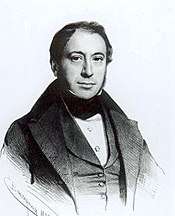Free University of Brussels
The Free University of Brussels (French: Université Libre de Bruxelles) was a university in Brussels, Belgium established in 1834. The university, founded on the principle of secularism by Pierre-Théodore Verhaegen and Auguste Baron, formed part of a reaction to Catholic dominance in Belgian education. In 1969, during the Linguistic Wars, it split into two separate universities: the French-speaking Université Libre de Bruxelles (known as ULB) and the Dutch-speaking Vrije Universiteit Brussel (VUB).
The two universities continue to collaborate and are together referred to as the Brussels Free Universities.
History

In 1834, in response to the foundation of the Catholic University of Mechlin by the Catholic church, many recognized the need for a secular counterweight to the new Catholic university. After sufficient funding was collected among, including Freemasons, led by Pierre-Théodore Verhaegen and Auguste Baron, the Free University of Brussels was inaugurated on 20 November 1834, in the Gothic room of the city hall of Brussels. This day, called St V is still celebrated today. After its establishment, the Free University of Brussels faced difficult times, since it received no subsidies or grants from the government; yearly fundraising events and tuition fees provided the only financial means. Verhaegen, who became a professor and later head of the new university, gave it a mission statement which he summarized in a speech to King Leopold I: the principle of "free inquiry" and academic freedom uninfluenced by any political or religious authority.[1]
The university's football team won the bronze medal at the 1900 Summer Olympics. After 1935 some courses were taught in both French and Dutch, but it was only in 1963 that all faculties held courses in both languages. During World War II, a resistance group, Groupe G, was formed among students at the university.
Splitting of the university
In the nineteenth century, courses at the Free University of Brussels were taught exclusively in French, the language of the upper class in Belgium at that time. However, with the Dutch-speaking population asking for more rights in Belgium, some courses were already taught in Dutch at the Faculty of Law as early as 1935. Nevertheless, it was not until 1963 that all faculties offered their courses in Dutch.[2] On 1 October 1969, the university was finally split in two sister institutions: the French-speaking Université Libre de Bruxelles (ULB) and the Dutch-speaking Vrije Universiteit Brussel (VUB). This splitting became official by the law of 28 May 1970, of the Belgian parliament, by which the Vrije Universiteit Brussel and the Université Libre de Bruxelles became two separate legal entities.[3] Some argue that ULB came off better; it is higher ranked in most international rankings (201-225, World University Rankings 2014-5[4]), and has kept most of the historic buildings in Solbosch, as well as developing a modern science campus along Pleinlaan in Etterbeek (Campus de la Pleine). VUB, on the other hand, started afresh and its smaller campus footprintheximus, right next to the ULB science campus, and is dominated by concrete buildings built in the 1970s, and now decaying. The fact that most of its academic staff publish and can teach in English has given it an edge in some areas, but its ranking is lower (351-400, World University Rankings 2014-5). Undergraduate and some postgraduate teaching is in Dutch.[4]
See also
References
- ↑ Witte, Els (eds.) (1996). Pierre-Théodore Verhaegen (1796–1862). 'VUB'Press (in Dutch). Brussels. ISBN 90-5487-140-7.
- ↑ "About the University: Culture and History". Vrije Universiteit Brussel. Retrieved 25 November 2007.
- ↑ "Law of 28 May 1970, concerning the splitting of the universities in Brussels and Leuven" (in Dutch). Belgisch Staatsblad/Flemish Government. Retrieved 25 November 2007.
- 1 2 "World University Rankings". Times Higher Education (THE).